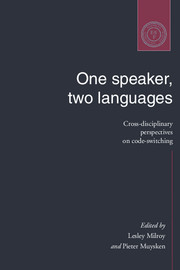Book contents
- Frontmatter
- Contents
- Notes on contributors
- Acknowledgments
- 1 Introduction: code-switching and bilingualism research
- Part one Code-switching in institutional and community settings
- Part two Code-switching and social life
- 6 The pragmatics of code-switching: a sequential approach
- 7 A social network approach to code-switching: the example of a bilingual community in Britain
- 8 Code-switching and the politics of language
- Part three Grammatical constraints on code-switching
- Part four Code-switching in bilingual development and processing
- Index
7 - A social network approach to code-switching: the example of a bilingual community in Britain
Published online by Cambridge University Press: 05 June 2012
- Frontmatter
- Contents
- Notes on contributors
- Acknowledgments
- 1 Introduction: code-switching and bilingualism research
- Part one Code-switching in institutional and community settings
- Part two Code-switching and social life
- 6 The pragmatics of code-switching: a sequential approach
- 7 A social network approach to code-switching: the example of a bilingual community in Britain
- 8 Code-switching and the politics of language
- Part three Grammatical constraints on code-switching
- Part four Code-switching in bilingual development and processing
- Index
Summary
Introduction
The chapters collected in this volume illustrate a range of approaches to code-switching behaviour, some of which seem rather distant from the primarily social one which we shall present here. However, a coherent account of the social and situational context of code-switching behaviour is an important prerequisite even where the perspective of the researcher is not primarily social (for an example, see chapter 14, this volume). This chapter attempts to develop a coherent account of the relationship between code-switching and language choice by individual speakers, and of the relation of both to the broader social, economic and political context. The exposition is presented both in general terms which emphasise its applicability to a range of bilingual situations, and with specific reference to the example of the bilingual Chinese/English-speaking community in Tyneside, north-eastern England.
It is evident from the abundant research literature that a wealth of data and analyses of code-switching behaviour from many very different communities is readily available. What seems generally to be lacking is a coherent social framework within which to interpret these data and analyses. For example, Heller (1990) remarks that while John Gumperz, an important leader in the field, has always viewed code-switching as constitutive of social reality, he has perhaps been less successful in linking this interactional level with broader questions of social relations and social organisation.
- Type
- Chapter
- Information
- One Speaker, Two LanguagesCross-Disciplinary Perspectives on Code-Switching, pp. 136 - 157Publisher: Cambridge University PressPrint publication year: 1995
- 45
- Cited by



